|
Conference
Report:
HARVARD
LAW SCHOOL LAMBDA
Gay and Lesbian Legal Advocacy
Conference on Don't Ask Don't
Tell
by
Denny Meyer
-Four
Vets Talk about Pride and Career Sacrifice-
On
March 2nd and 3rd, 2007, at Harvard, HLS Lambda
presented a prestigious DADT conference of
leading legal scholars, experts, spokespersons,
and veterans. Six panels presented aspects
of the issue including public policy, legal
considerations, service members' experiences,
and permutations of minority inequality in
the military.
Speakers
included Joseph Steffan (USNA disch. due to
homosexuality, author of Honor Bound: a Gay
American Fights for the Right to Serve His
Country), Lawrence Korb, Dixon Osburn (E.D.
and cofounder of SLDN, GALLA 2nd Annual
Leadership Award), Tim Bakken (Prof. of Law West
Point), Susan Sommer (Sr. Counsel NY Lambda
Legal), Laurence Tribe (Univ. Professor Harvard,
115 books, 34 cases US Supreme Court), Sharon
Alexander (SLDN Deputy Dir. for Policy, former
Capt. USAR), Joan Darrah (Capt. USN, ret.),
Brian Frickie (former Sgt USMC, Iraq vet),
Elizabeth Hillman (USAF vet), Joe Lopez (former
Capt. US Army, Blackhawk Helicopter Platoon
Leader -Iraq), and Lory Manning (Capt. USN,
ret.), among others.
I
was both an observer and panel participant (on
public policy) at the conference. I spoke
about the history of gays in the military, and
the different experiences of those who served in
invisible silence during the Vietnam Era
compared with current era service members who
have never lived in the closet coping with the
military's intense official homophobia.
The
conference panel on Service Member
Experiences was the most moving and
memorable for many attendees.
Summaries of the stories they told follow in the
paragraphs below.
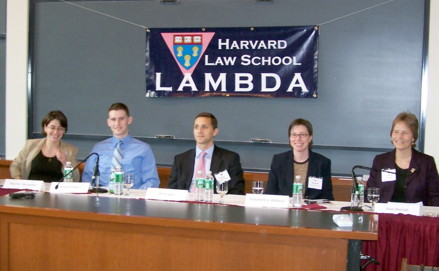
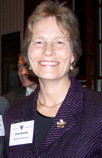 |
Joan
Darrah, Capt. USN, ret., who entered the US Navy
in 1973, spoke of the challenge of having been
the first woman in many of her military
assignments, such as Intelligence Officer.
Prior to her having excelled in such positions,
the reasons given for why a woman could not fill
them were nearly identical to those being given
now for why gays may not serve in our armed
forces. In the early 1990s, under
President Clinton, the issue of gays in the
military came to the fore, leaving her coping
with the discomfort of dealing with
discrimination. One episode has remained
permanently painful in her memory: an admiral
praised her outstanding job performance just prior |
| to a meeting of senior officers in which
he said, "We have no room for gays in the
Military." While she focused on her
work and the love and support of her partner,
friends, and family, since that moment she
suffered having had live in fear of being Outed.
On September 11th, 2001, she had attended a
meeting in the section of the Pentagon that was
destroyed in the terrorist attack moments after
she left the building. She subsequently
realized that had she been killed in the attack,
her life partner would not have been notified
nor have any standing or recognition as a
surviving spouse. Shortly thereafter she
decided to retire from the Navy that had been
her life career. She has since devoted
herself to speaking out against DADT in order to
"fix her beloved Navy." |
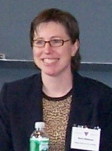 |
Elizabeth
Hillman joined the Air Force ROTC for the
scholarship funds that enabled her to attend
college. In her career as an Air Force
officer she served in the Pentagon and was
involved in Space Ops, and loved the experience
of leadership and camaraderie of military
life. While teaching history at the Air
Force Academy, she met many highly motivated
cadets whose greatest fear, under DADT, was
being outed in the atmosphere of intense
scrutiny in which they lived at the
academy. Post posters stressing
'Integrity' amongst cadets, only created greater
stress for those forced to hide their
sexuality. Ultimately, she herself left
the Air Force, without explanation, |
| rather than
continue the required deception. She
believes that, while war has made minorities a
crucial resource for our armed forces, the
military's hierarchical structure intensifies a
fear of disrespect with regards to homosexual
service. |
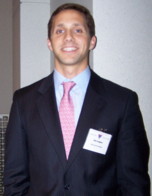 |
Joe
Lopez went to West Point in order to become a
leader. In flight school, he finished
second in his class with three helicopter
qualifications. In Iraq, Captain Lopez was a
Blackhawk Helicopter Platoon Leader and was
awarded an Air Medal and Army Commendation
Medal. He led a difficult double life,
however. On weekends he had to part ways
with his military friends in order to have his
separate life with gay friends and dates.
In Iraq, a combat zone, that was impossible, of
course. He was unable to engage in the
personal talk amongst peers, and at times cried
both from loneliness and fear of outing, wishing
that he could share the letters from his lover
with his mates. He lived, he said, in a
climate of constant fear, not knowing whom to
trust, fearing dishonor for living a lie. During a mortar attack in Iraq, while everyone
else was taking cover, his first |
| thought
was to hide his letters from his lover
lest they be discovered. At that
moment, he realized how ridiculous his
situation was and decided to leave the
Army after completing his tour.
Crying, he described how he still prays
for the safety of his troops and how
awful he feels about not being there
with them. He knows how the Don't
Ask Don't Tell policy degrades both
individuals and the military. |
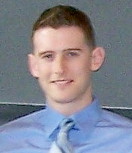 |
Marine
Corps Sgt. Brian Fricke did not let
being gay stop him from following in his
grandfather's footsteps in serving his
country in uniform. Although he
was open to peers and one of his
commanding officers had a policy of not tolerating
discrimination, Sgt. Fricke continually consciously
experienced the pain of
inequality. When he was being
deployed to Iraq, his lover dropped him
off and they dared a quick goodbye
kiss. But, he saw others in his
unit having normal prolonged goodbyes
with their wives; and knowing that he
could not do that, he felt deprived. It
made him feel like a deceptive outsider
from his fellow Marines in |
| his
unit. Although he came out to friends in
Iraq and was accepted, there was the
constant fear of loss of honor; and a
fear that if he died in combat, his
lover would not receive the respect he
deserved for his sacrifice and
loss. Upon his unit's return to
the US from Iraq, there was a huge
ceremony with flags and crowds of family
to greet their loved one's safe
return. His lover, of course,
could not be there and be a part of
that. And that moment of
deprivation due to DADT made Sgt. Fricke
feel like an outcast, and for him the
joyous welcoming home ceremony was empty
and sad. Sgt Fricke cried as he
described that time and his decision not
to reenlist under the oppression
of the policy that denied him and his
lover the same honor and respect that
others had. |
These
stories of pride and career sacrifice tell of
the pointless loss of dignity and service by
some of our nation's most highly qualified
enlisted personnel and officers, purely to
maintain an ideological bigotry that has no
place in America's armed forces.
|
![]()